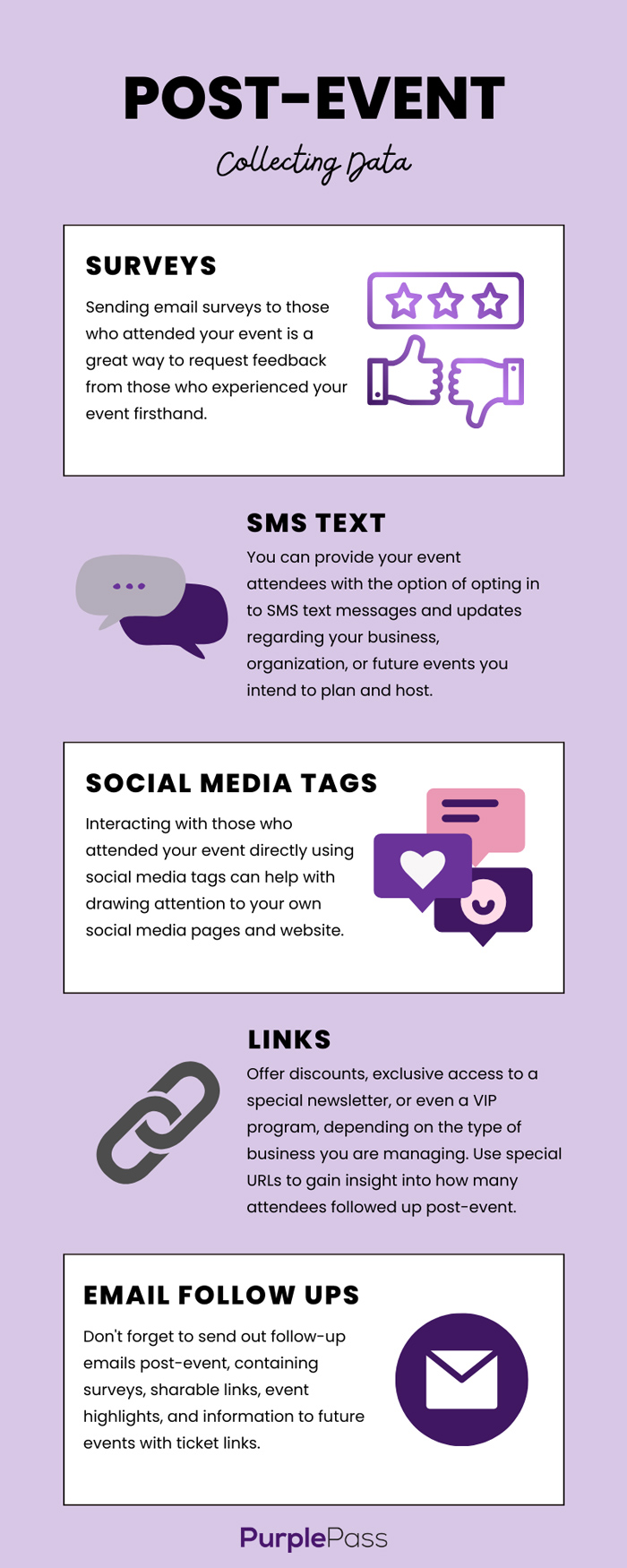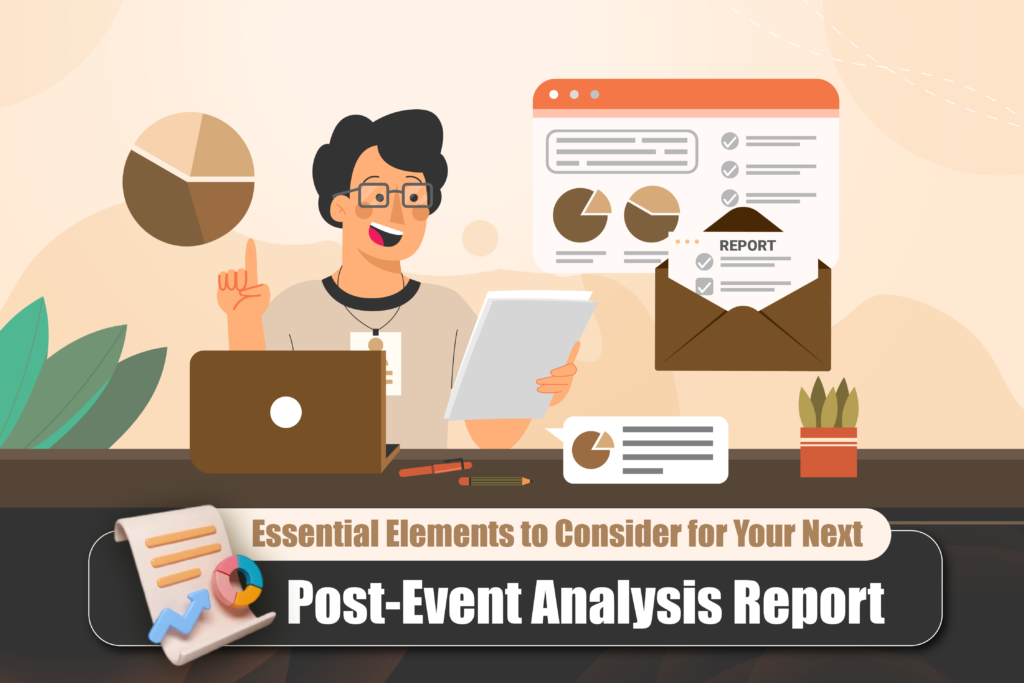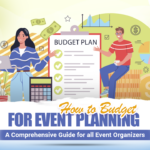- Conventions
- Conferences
- Festivals & Fairs
- Food & Tastes
- Performing Arts
- Free guides
- In the news
How To Write An Effective Post-Event Report For Sharing Results

Savannah McIntosh
Apr 6th, 2023
Event Planning 101
Share this post

Hosting an event is a big undertaking, and it's important to evaluate how it went after the fact. A post-event report can help you assess the success of your event, identify areas for improvement, and share the results with stakeholders.
In this article, we'll explore the key components of building an effective post-event report and provide tips on how to create one.

1. Introduction
The introduction should provide a brief overview of the event and its objectives. This section should also include any background information that is relevant to the event, such as previous events that were held or the purpose of the event.
2. Executive Summary
The executive summary should provide a high-level overview of the event and its key outcomes. This section should include information on attendance, revenue, and any other key metrics that were tracked. It should also highlight any successes or areas for improvement that were identified during the event.
3. Event Overview
The event overview should provide a detailed description of the event, including its purpose, format, and structure. This section should also include information on the venue, date, and time of the event, as well as any relevant logistics or details that were important to the event's success.
4. Audience Profile
The audience profile should provide a detailed description of the attendees, including their demographics, interests, and motivations for attending the event. This section should also include any feedback or comments that attendees provided during or after the event. For more information on how to collect this type of data, click here .
5. Key Performance Indicators
The key performance indicators (KPIs) should outline the metrics that were used to evaluate the success of the event. These metrics should be specific, measurable, and relevant to the event's objectives. Some common KPIs include attendance, revenue, engagement, and social media mentions.
6. Results and Analysis
The results and analysis section should provide a detailed overview of the KPIs and how they were met or not met. This section should also include any insights or observations that were made during the event, as well as any feedback that was received from attendees or stakeholders.
It's important to provide context for the results and explain why they are important for evaluating the success of the event.
7. Lessons Learned
The lessons learned section should provide a summary of the key takeaways from the event. This section should include both positive and negative observations, as well as any opportunities for improvement that were identified. It's important, to be honest, and transparent in this section, as it will help you to improve future events and address any issues that were identified.
8. Recommendations
The recommendations section should outline any actions that should be taken based on the results of the post-event report. This section should include specific recommendations for improving future events, as well as any changes that should be made to the current event. It's important to prioritize the recommendations and provide a clear action plan for implementing them.
9. Conclusion
The conclusion should provide a summary of the key findings from the post-event report. This section should also highlight any successes or achievements that were made during the event, as well as any key takeaways or lessons learned.
Tips for creating an effective post-event report
Define the objectives of the event: It's important to have a clear understanding of the objectives of the event before you start creating the post-event report. This will help you to identify the KPIs and metrics that are most relevant to evaluating the success of the event.
Collect data and feedback: Collecting data and feedback is essential for creating an effective post-event report. Make sure to collect data on attendance, revenue, engagement, and any other relevant metrics. You should also collect feedback from attendees, stakeholders, and any other relevant parties to get a full picture of how the event went.
Analyze the data and feedback: Once you have collected all the data and feedback, it's important to analyze it thoroughly. Look for trends, patterns, and insights that can help you to understand what worked well and what didn't. Be sure to pay attention to any feedback that is critical, as this can provide valuable insights for improving future events.
Use visuals to present data: Presenting data in a visually appealing way can help to make it easier to understand and digest. Consider using charts, graphs, and infographics to present data and metrics in a clear and concise way.
Include both quantitative and qualitative data: Quantitative data, such as attendance numbers and revenue, can provide important insights into the success of an event. However, it's also important to include qualitative data, such as attendee feedback and observations, as this can provide a more holistic view of the event.

Provide context for the data: When presenting data, it's important to provide context so that readers can understand what the numbers mean. For example, if attendance was lower than expected, explain why this might have happened (e.g. bad weather, competing events, etc.).
Highlight successes and areas for improvement: When presenting the results of the post-event report, be sure to highlight both successes and areas for improvement. Celebrating successes can help to build momentum and enthusiasm for future events while acknowledging areas for improvement can help to identify opportunities for growth and development.
Make recommendations for future events: Based on the results of the post-event report, make recommendations for future events. This might include changes to the event format, venue, or marketing strategy, or recommendations for improvements to specific aspects of the event.
Create an action plan: To ensure that the recommendations in the post-event report are followed up on, create an action plan that outlines specific steps that need to be taken. Assign responsibilities and deadlines for each task to ensure that they are completed in a timely and effective manner.
By following these tips, you can create an effective post-event report that provides valuable insights and recommendations for improving future events.
Previous Post
Related Posts

15 Oct 2024

08 Oct 2024

Essential Elements to Consider for Your Next Post-Event Analysis Report

An event is organized to fulfill specific business objectives. To keep going in the industry, every organization must continuously evaluate its past event management process, learn from its shortcomings, and improve to seek growth. This is where post-event analysis comes in.
After every massive B2B event, event marketers meticulously gather event data and insights to analyze overall performance. A comprehensive post-event report or an event debrief is a crucial document that enables event stakeholders to analyze pertinent data and make recommendations and changes to their event strategies in the future.
For those of you in the event industry, here is a detailed guide on how to write an effective post-event report.
Basic Structure of a Post-Event Analysis Report
A post-event analysis report must contain the following elements.
1. Executive Event Summary
A compelling post-event report has all the necessary information for the stakeholders to make critical decisions for future events. The event summary or executive summary is a preview of the entire event. It can include details about the nature of the event, its goals and outcomes, the total attendee list, highlights of the event, the overall budget, and participant feedback.
2. Event Overview
The critical information to include in this section is the event name, location, purpose, total number of attendees, target audience, the event’s aim, recreational activities conducted during the event, and any significant accomplishments.
3. Event Goals
While planning the event, you must have identified pertinent event goals based on which you went about the planning process of your event. For example, goals for a trade show could be to attract x number of industry professionals to the event and to achieve y% rebooking for exhibitors in the upcoming year. Similarly, mention the goals of your event in this section as it is a prelude to the next topic in the post-event evaluation report.
4 . Key Metrics & KPIs
Qualitative and quantitative data form the backbone of any post-event report. Under this section, you will identify and specify all the critical performance indicators for the event. To help you write a detailed event report, here are a few pointers you might want to look at:
i) Registration Conversion Rate:
The total number of people registered versus the total number of people who came for the event.
ii) Total Attendance
This is simply the total number of people who attended the event.
iii) Session Participation
The level of participation of attendees in each session. Many attendees choose to attend the keynote and then roam around the event venue and network, whereas many opt to attend sessions and workshops at the event venue.
iv) User Activity on the Event app
Most event apps are proficient in collecting data about users, their level of interaction with other attendees, and their overall experience at the event.
v.) Revenue Generation and ROI
At the heart of every event is a cause to promote, sell, or propagate something that will, in turn, generate revenue for the event stakeholders. This section will provide data to assess the event’s profitability by understanding the total revenue generated through registrations, event activity participation, booths, etc. This data will then be compared to the total investment to determine the ROI.
vi.) Average Feedback Score
This is the cumulation of attendee scores from feedback forms. It helps understand the attendees’ overall sentiment regarding the event.
vii.) Complaints logged
The event app usually allows attendees to log in with complaints about the venue facilities.
viii). Social Media Reach
All event pages on social media will have the overall engagement data that can be added in this section.

ix) Lead Generation
Trade shows and fairs usually have lead generation data, which can be mentioned in this section.
x) Email Marketing Performance
Understand the open and click-through rates of pre-event and post-event emails. This metric gauges the audience’s engagement and interest in the event’s content and updates.
xi). Event App-related Operations
Check to see if your event app offers a smooth navigation experience to the attendees. If there were any glitches, mention them here.

xii). Content-Engagement Score
This metric measures how the audience reacts to specific event content, whether promotional or during the event. It helps event organizers gauge the overall reception of their content strategy.
xiii). Sponsor Engagement
This metric tracks the engagement between sponsors and attendees to see how they benefited from the event.
xiv). Networking Success Rate
Understand the level of networking through event app data and post-event feedback forms of attendees and mention it under this section.
5 . Marketing and Promotion
Mention all the marketing channels and activities to promote the event. Also included is the promotional activity’s impact on lead generation and the attendees’ turnout at the event. Your feedback form can have questions about where the attendees learned about the event. Questions like these give an overview of how the event marketing efforts worked for the organizers. The level of digital engagement before the event and the activities conducted for the buzz generation can all go under this section. Be as elaborate as possible by mentioning everything done to promote the event.
6. Attendee Feedback
An event’s overall success largely depends on participant experience and attendee feedback. An event marketer’s job doesn’t end there once the event is done. He has to go to distribute event survey forms and collect attendee feedback on their experience at the event. Your event management platform will have all the pertinent data for this section.
In the post-event report, you have to collate all the data you have acquired through the survey results and mention it under this section to state the overall sentiment of attendees at the event.
7. Content & Sessions
Content is the main asset of any B2B event. It is the primary offering of every event to its attendees. The nature of content and its delivery can make or break an event, especially when it is virtual.
Under this header, mention all the topics discussed at the event. Give a detailed description of all the workshops, seminars, and learning sessions held at the event. Also, note the audience reception and feedback in this section to understand what worked for them.
A winning content strategy should be there in every event marketer’s arsenal. In one of our podcasts, Hugh Forrest , an event marketer, stressed the relevance of community-generated content for promotions and events. He said,” Well, over the last roughly 15 years, we have embraced the UGC idea– user-generated content, where we rely on the community to provide about 70% of our total content that comes in via an interface that we developed called the PanelPicker and the primary impetus here is that the community understands specific industries better than we do (sic).”
Similarly, identify which content strategy works best for you in the event and mention it in the report.
8. Logistics & Operations
In any event, logistics and operations play a significant role. From the selection of the venue to setting up the event space, arranging all the electrical supplies, coordinating transportation for attendees, arranging their stay, handling all the catering requirements, hiring the right hospitality staff, arranging vendors and stalls, and ensuring a smooth flow of the event, these are all functions that come under logistics and operations.
Mention all the logistical undertakings and the challenges faced while doing so. Usually, all these processes are aligned with the event management software the organizers opt for.
9. Challenges and Lessons Learned
In as much detail as possible, note down all the hurdles and obstacles you may have encountered before and during the event. Conduct a root cause analysis and state them in this section. This is one of the most crucial elements of post-event data you will need for future events. Everything above leads to this one section.
10. Recommendations for Future Events
The whole idea behind creating a post-event analysis is to generate concrete and actionable insights for upcoming B2B events. It is a learning guide for event organizers to improve their game.
In the previous section, you identified what worked and what didn’t, and now it’s time to jot down solutions to avoid mishaps in the future. For example, if food was an issue at the event, then understand what went wrong. Analyze if it was the supply or quality of food or how it was distributed. Good food and conversation are a deciding factor for the overall attendee experience.
In most event reviews on Eventible, food and beverage are the topics discussed most after speaker sessions and content delivery. Look at our events page to see what people are talking about your favorite B2B event.
11. Concluding Summary
End your post-event report with a summary of the event’s success and an overall assessment. An analysis does not have to be purely focused on the negatives of the event. You can highlight the green flags here and make note of which strategies worked for you and why. This can then be replicated in the future for other corporate events. Lastly, reinforce the learnings and recommendations of the report.
Why Do You Need a Post-Event Analysis Report?
The event industry is a dynamic space where everything is action-oriented. However, conducting a post-event analysis is rather academic in nature. It requires a lot of research, data collection, data collation, and analysis. So, why would event marketers and event organizers go through the trouble of creating elaborate post-event analysis reports and templates?
In a conversation with the Senior Director, Global Event Experiences and Field Marketing at UserTesting, Noelle Peterson said that post-event reports have helped them understand what works and what doesn’t. With this knowledge they were able to add interactive sessions, make registration smoother, and shift resources where they have the most impact thereby enabling them to create more successful events.
“The most important part of a post-event report is the actionable insights. It’s not just about numbers like attendance or feedback—it’s about finding ways to improve. These insights help us plan better, from event logistics to attendee experience, making future events more successful”, she said.
During a conversation with Gerry Schneider, Former Vice President Events at WeRDevelopers, he said, “ Implementing post-event analysis reports has profoundly influenced my approach to event organization and management. The insights gained from these analyses are crucial in identifying what worked well and what needs improvement. “ For instance, Schneider mentioned that after organizing WeAreDevelopers World Congress last year, their post-event review highlighted issues with attendee engagement during breakout sessions. By analyzing the feedback and participation data they received, they realized there was insufficient interactive space.
“As a result, we revamped our approach. We created more engaging zones and networking areas where attendees could meet, including unique features like our Tiny Houses. These new elements fostered better interactions and networking opportunities among attendees,” he said. This iterative improvement, he added, led to higher ratings and more positive feedback in their recent events, demonstrating the tangible benefits of thorough post-event analysis.
Event marketers from across the globe swear by the need for an effective post-event report template to systematically record their event data to form useful recommendations for their future events. It also helps them understand where they stand in terms of overall performance metrics of the event with respect to other events in the industry. This micro and macro comparison is a catalyst for improvement and growth for event organizers.
What Is The Process Of Creating An Effective Post-Event Report ?
A post-event report comprises many elements. In our conversation with Gerry S. an event marketer, we decoded the key steps involved in creating an effective post-event report. The first step is feedback collection . For this step, you can use surveymonkey or Google forms which you can send to your attendees on the last day of the event on their apps or their email Ids. Ask them to revert at the earliest and maybe even make it a contest by saying that top 10 earliest responders will be given a voucher.
The next step is data analysis, after collecting all the data you can use analytical tools like Excel to identify trends and areas that require improvement. This helps in gauging the attendee satisfaction, session effectiveness and logistical issues. Once you are done with this step now it’s time to conduct debrief meetings . Organize external and internal debrief sessions with your team stakeholders and suppliers to discuss the feedback and data collected. This approach helps in pinpointing issues and brainstorming solutions.
The last step involves summarizing the findings into actionable steps. You can create an entire report outlining key issues, proposed improvements and an action plan for implementation. Gerry suggests the use of tools like Jira that can help track the progress of the actionable recommendations. This structured approach ensures that every aspect of the event is reviewed critically, leading to more effective improvements and better outcomes in future events.
Can Post-Event Reports Help Attract Sponsors?
Post-event reports can be powerful tools for attracting new sponsors and retaining existing ones for upcoming events. These reports contain data that indicate the success, as in the ROI, of the sponsors for past events. They also magnify the scope of reach for these sponsors and how they can benefit from associating with a particular event.
Data such as attendance numbers, social media engagement, registration conversion rates are crucial for sponsors to make informed decisions. Sponsors are more inclined to invest in events that have long-term gain. Moreover, post-event analysis reports shine a light on sponsor activations and their effectiveness.
By emphasizing the sponsors’ contributions and the engagement that their activations generate, organizers can reinforce the value that sponsors bring to the event. This not only strengthens the relationship between sponsors and the event but also increases the likelihood of securing future sponsorships, fostering long-term partnerships.
Key Takeaway
At the end of the day, every event organizer wants to consistently create successful events, and post-event data helps them identify winning event strategies and practices. There is heavy investment in every global B2B event, and these reports give a bird’ s-eye view to all event stakeholders, who are then in a better position to make informed decisions. You can decide which areas need to be optimized, eliminated, or replaced. A comprehensive post-event analysis ultimately empowers teams to make data-driven decisions, enhance future event experiences, and create even more impactful and successful experiences.

How to Budget for Event Planning: A Comprehensive Guide for all Event Organizers

How Event Data Analytics Can Help You Push Event Boundaries in 2024
Related posts, 20 mental health tips for event planners that will help keep stress at bay, a comprehensive guide on how to manage multiple teams and vendors at large events.
Comments are closed.
Alison Bensch
Senior director of global events, cloudinary, proudest of.
In both cases, we had to figure out how to take what are historically in-person events and translate them into engaging virtual experiences with a team of just two in-house event marketers, counting myself.
ImageCon is our flagship customer summit. In 2021, more than 1,700 people across 107 countries registered for the two-day event, which included 20 virtual sessions designed to help retailers unleash the full potential of their visual media.
Our hosted event series included about 8 virtual events across North America and EMEA markets. To drive up attendance and engagement, we hosted unique virtual cooking and mixology classes, wine tastings, tequila pairings, and more, with celebrity chefs and bartenders such as Marcus Samuelsson, Julio Cabrero, and Amanda Freitag.
Rockstar Mode
ImageCon was a success, in part, because we secured high-quality speakers and focused on providing true value to attendees by creating sessions to optimize their usage of the Cloudinary platform to improve their business. We featured customers in the content by doing customer spotlights. We also improved the production level of the summit by partnering with an agency.
I am proud we were able to pull off a high-quality event of this scale while managing 30 other events for the year.
Prior to the pandemic, our hosted event series consisted of in-person dinners and intimate happy hours. We wanted to recreate these virtually, without making them feel like webinars. We succeeded, in part, because we invested in high-quality talent to attract participants and create fun, memorable moments we probably could not have pulled off in-person.
We also took pains to make the events as easy as possible to attend, for example, by mailing guests meal kits or drink kits with everything they needed to participate. Of course, everything was branded, right down to the salt and pepper. We know our attendees’ time is precious, so we encouraged them to involve their family and were sure to include enough food and/or drink to share.
After the experience, we broke out into small groups, allowing people to network with peers and Cloudinary team members, who led discussions on relevant industry topics. Thus, attendees topped off a great culinary or cocktail experience with valuable learnings that could help their business. In fact, I see us continuing with some of these virtual events even after we have resumed in-person ones.
Our on-demand event content is now a powerful sales enablement tool for our sales team, who share session recordings with prospective customers, as well as existing ones who are considering adding on a new capability. We will continue to measure the performance of this content.
For the hosted events, we evaluate success by measuring pipeline acceleration. So, we consider where event guests are in their consideration process before attending the event. We use the event, and event follow-up, to help move the prospect or customer to the finish line. We usually see prospects who engaged in marketing campaigns were more likely to close, and close faster, than those who did not attend an event.
While this is harder to measure, we know our event series keeps the Cloudinary brand top of mind and deepens our relationship with customers. We document the positive feedback we receive from attendees and sales reps for internal use and marketing purposes.
Survivor Mode
Another challenge was creating an event strategy against a backdrop of so much uncertainty. I have seen industry colleagues invest resources in planning in-person events, only to have to rejigger in the final hour. I made the decision from the onset of the year to plan for virtual events, given our small team and resources. This allowed us to create more effective and engaging virtual events from the start and maximize our budget.
Nothing beats in-person events, and I am excited to be moving forward with these in 2022. But I plan to continue with digital and hybrid events, as well, for a number of reasons. When done right, they can be more memorable than in-person ones, and certainly more convenient. They also allow me to engage people across a wider geographic region (all of Europe for example or across the US), which leads to cost-savings and unique and widened interactions for our attendees.
Annie Yuzzi VP
Global corporate events and experiences, sumo logic, bethany roskin murphy, director of global events, drift, charlene kate ditch, founder, charlene kate events, gabrielle d., global events director, automation anywhere, gerilynn marburger, director, global events, hewlett packard enterprise, hollie ashby, senior manager, cxo and third party events, palo alto networks, lindsey cohen, director- event marketing, snyk, ceo & chief event strategist, liz king events, nicola kastner, vice president, global head of event strategy, sap, rachel russell, field marketing manager, even, samantha calle, associate director, xandr, margaret shaeffer, head of field marketing & events, linearb, traci depuy, head of global events, salesforce, dale rickert, global conference head of greentech festival, matthew lin, head of marketing, beetc, emilie watrob, head of event marketing, zs, katherine leong, director, corporate events, gainsight, sr. director, marketing technology (brand and events), salesforce, karim youssef, creative director, dpw, elizabeth thomas, head of global events, elastic, gerry schneider, vp events at wearedevelopers, director, global events at hewlett packard enterprise, mike kalyan, event and seminar marketing manager, shrm.

LOVE EVENTIBLE?
Disclaimer: If you choose to provide us with your email address or any other personally identifiable information, we will use it only to send you our newsletter or respond to your query.

IMAGES
VIDEO